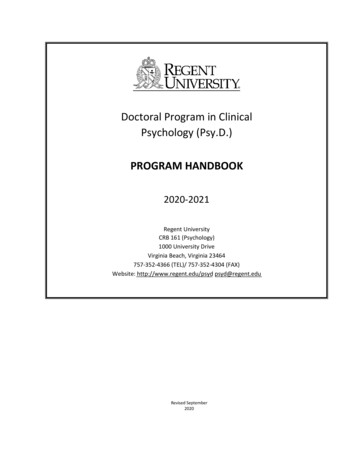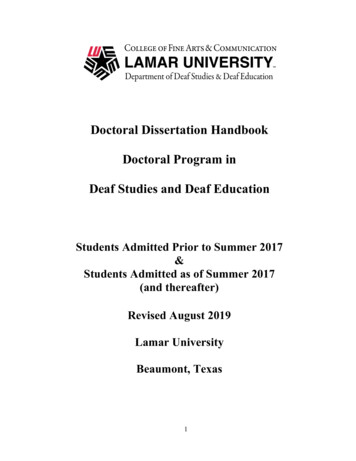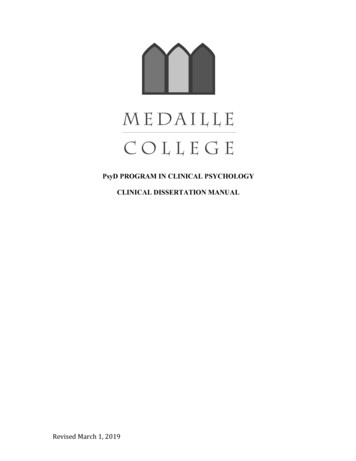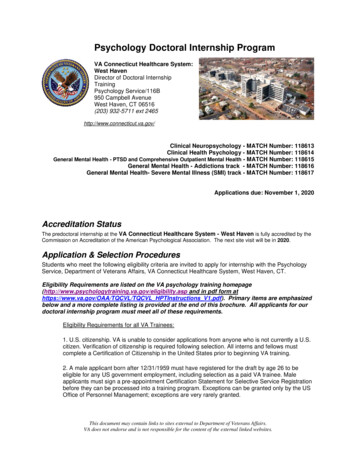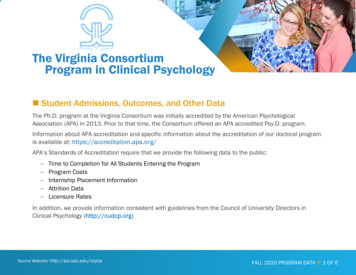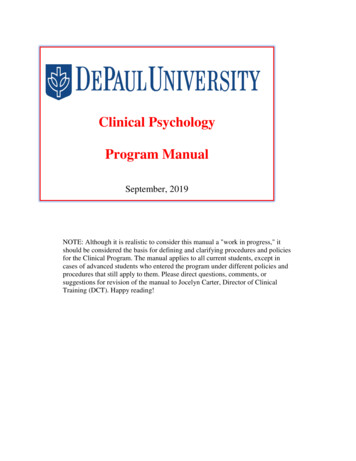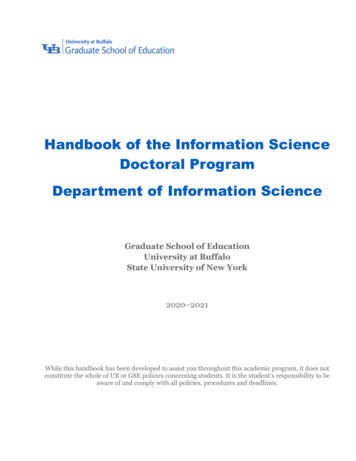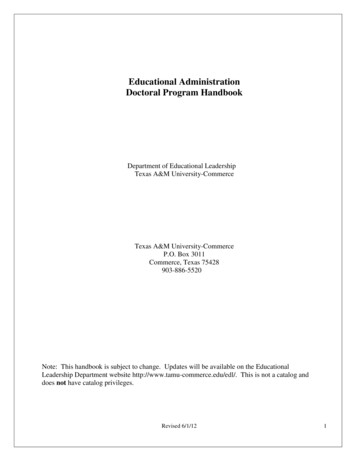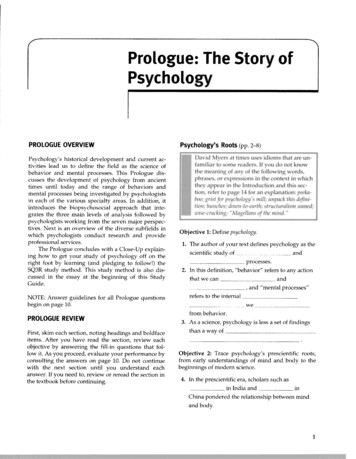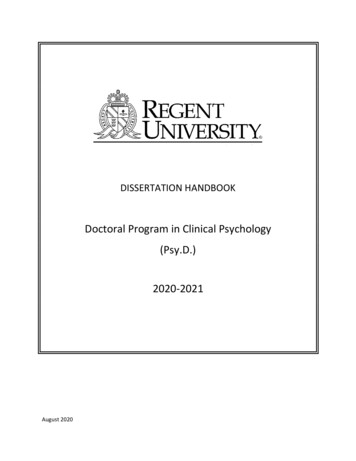
Transcription
DISSERTATION HANDBOOKDoctoral Program in Clinical Psychology(Psy.D.)2020-2021August 2020
Program Handbook PolicyThis handbook summarizes the policies regarding the dissertation requirement in effect for the DoctoralProgram in Clinical Psychology at the start of the 2020-2021 academic year. All policies and requirements aresubject to change. Students are expected to regularly review program announcements that accompany suchchanges and then to abide by the changed policies. Students from all cohorts are obligated to follow currentprogram policy and procedures, as they evolve, unless otherwise stated.IMPORTANT NOTE: Handbooks are updated each year. Students must adhere to thecurrent academic year’s handbook for all program requirements with the exception ofrequirements for programs progression outlined in the University Catalog.Summary of Changes From the 2019-20 Dissertation Handbook APA Publication Manual, 7th Edition required, JARS guidelines are includedAugust 2020
2Table of ContentsCHAPTER ONE: Introduction . 4The mission of the Doctoral Program in Clinical Psychology (DPCP) at Regent is to strive to: . 4Regent Psy.D. Peer Discussant Scholarly Standard . 5CHAPTER TWO: Types of Dissertations . 7Types of Research Designs . 7Types of Data Collection/Utilization . 8CHAPTER THREE: The Regent PsyD Dissertation Process . 9Formulating a Topic . 9Writing a Proposal (PSY 700) . 9Timeline for Dissertation . 10Chapter Four: Writing the Dissertation Proposal . 15Scientific Journal Article Format . 15Chapter Format for Theoretical Papers or Other Types of Papers . 16Chapter 5: From Proposal to Defense. 19Dissertation Proposal Meeting . 19Proposal defense process . 19Human Subjects Review. 21Implementing the Dissertation Project. 21Present Dissertation at Practitioner-Scholar Research Symposium . 22Oral Defense of the Dissertation . 24Dissertation defense meeting process . 25Chapter 6: After the Defense . 27Copy editing . 27Continuous Enrollment . 27Publication and Presentation of Dissertations . 28Chapter 7: Structure of the Dissertation . 29Dissertation Components . 29Prefatory Pages . 29Title Page. 29Abstract . 29August 2020
3Acknowledgments Page (Optional) . 30Table of Contents . 30List of Tables . 30List of Figures . 30Body of the Text: Traditional Dissertation . 30Introduction . 31Method . 31Results . 32Discussion . 32References . 32Appendices. 32Body of the Text: Non-Traditional Dissertation . 33Introduction . 33Intervening Chapters . 33Conclusion/Summary Chapter . 33References . 34Appendices. 34CHAPTER 8: FORMAT AND STYLE. 35APA style and university requirements. 35Some points on spacing . 35Registrar’s Office Policy . 36APPENDIX A: Sample Dissertation Prefatory Pages . 37APPENDIX B: Dissertation Checklist Form. 41APPENDIX C: Dissertation Forms . 45Appendix D: Research Dissemination Probe Rubric . 46August 2020
4CHAPTER ONE: IntroductionThe mission of the Doctoral Program in Clinical Psychology(DPCP) at Regent is to strive to:1. Educate doctoral students in a broad and general clinical practitioner scholar model, to obtaincareers in health services psychology.2. Educate students in integration of psychology and Christian worldviewThe dissertation should reflect the student’s emerging ability to provide scholarly leadership in theseareas. Such leadership involves making a substantial contribution to the field of psychology. Acommensurate level of excellence is required in the conceptualization, development and manuscriptwriting of the dissertation. The project itself may take many forms. Here are some examples:a) the development of a new scale to assess some important aspect of personal adjustment;b) formulation of a new clinical construct that is useful for explaining a clinical process orphenomena;c) investigation of a hypothesized relationship between variables which may help illuminate theetiology of a disorder;d) exploration of treatment efficacy of a therapeutic technique or approach;e) performing an in-depth case study illustrating advanced conceptualization skills;f) analyzing the mental health effects of public policy decisions, org) providing a new theory of previously researched areas that takes the field in promising newdirections.In addition to these scholarly production activities, some students may be approved to meet thedissertation requirement by completing a professional service project representing a doctoral level ofexpertise in the provision of an important service to the university, profession or public.Christian integration. The dissertation should address issues or areas of relevance related tomatters of Christian faith or worldview. Such connections should be explicitly examined in a mannersensitive to the diverse religious perspectives relevant to the topic. In such discussions, the level ofAugust 2020
5interaction with the field of psychology should be of a level commensurate with advanced doctoralcandidacy.Students may choose to focus on topics that directly involve a Christian worldview, for example,an outcome study for a treatment protocol adapted to Christian beliefs and/or practices, anexamination of factors related to God image, or development of a new model of integration or use ofspiritual disciplines in therapy. With such topics, these discussion should be part of the main body ofthe dissertation.Topics not directly involving Christian practice or worldview should examine potential implicationson Christian practice or thought and/or be critically examined from a Christian worldview. In suchcases, discussion would normally be done as a separate addendum in the dissertation.In addition to the leadership reflected in making a substantive contribution to the field,students are also expected to reflect the values of diligence, integrity, and scholarship common to bothbiblical thought and the professional discipline of psychology. The student must display writing skills thatare at a level worthy of a doctoral candidate. The composition of the dissertation must reflect propergrammar, correct spelling, and a writing style commensurate with the nature of the project. Themanuscript should also exactly conform to the specific format requirements outlined in thishandbook. The student should take care to discharge his or her responsibilities in a timely manner andmaintain a good working relationship with all committee members and others involved in thedissertation process. Students are encouraged to be creative with their ideas, but they must displayreceptivity to feedback. Proper ethical conduct while doing the dissertation, as outlined in APA’sethical principles and code of conduct, is an expectation (http://www.apa.org/ethics/code/).Regent Psy.D. Peer Discussant Scholarly StandardRegent’s Doctoral Program in Clinical Psychology (Psy.D.) is committed to a practitionerscholar model of training with the primary goal of preparing its graduates to be professionals whoapply the discipline and science of psychology in a practice setting. Although research skills and fieldscience abilities are part of the competencies we aim to instill in our graduates, we are not attemptingto prepare our modal graduates for traditional research careers. Consistent with this training vision,our students must demonstrate a peer discussant standard of scholarship in their dissertationprojects. A peer discussant standard is evident when one demonstrates mastery of the scholarshipin an important psychological area and an ability to make a meaningful application, utilization,extension, or novel contribution to that area. Note: In contrast to traditional research focuseddegrees, the peer discussant does not require students make substantial novel contributions to thescientific body of knowledge. While such an achievement would demonstrate the peer discussantAugust 2020
6standard has been met, other suitable applied scholarly goals than novel scientific discovery may alsosatisfy this standard. Thus, this handbook outlines diverse types of acceptable dissertation projectsthat could meet the Regent standard.August 2020
7CHAPTER TWO: Types of DissertationsDissertation projects can be broadly classified as either basic or applied. Basic research projectshave as their goal the rigorous production of scientific knowledge. In psychology, basic research tendsto use true experiments to establish cause and effect relationships. Applied research projects havemore pragmatic goals of addressing practical problems with insights drawn from psychologicalscience. Applied research projects typically adopt quasi-experimental, comparative, associational, orexpository/descriptive research designs. A less common form of dissertation project would involve aprofessional service project. This type of dissertation is not a research project as much as narrativedescribing a program development initiative of sufficient quality and value to the program to fulfill thedissertation requirement. For all types of dissertations, qualitative, quantitative or mixed methodparadigms are acceptable.Types of Research DesignsListed below are several examples of various dissertation projects that would be appropriate:True Experimental DesignsParticipants are randomly assigned to a cognitive-behavioral therapy group with an explicitlyChristian content and an attention-placebo control group to ascertain therapeutic efficacy.Quasi-Experimental DesignsAn interrupted time series design is used in program evaluation to assess the effects of anEmployee Assistance Program on employee satisfaction and mental health.ComparativeDepressed clients with personality disorders are compared to depressed clients withoutpersonality disorders on quality of therapeutic relationship and duration of treatment.AssociationalThe correlation between measures of Openness to Experience and religious commitment isexamined in a college student sample. Regression models exploring the predictive power of martialsatisfaction for longevity would be another example.Expository/DescriptiveA comprehensive literature review summarizing the role of a clinical psychologist in primarycare settings might illustrate this approach. Qualitative projects, such as a thematic analysis ofAugust 2020
8common reasons clients in “Christian counseling” settings report for seeking a Christian counselingbased on verbatim transcripts of taped sessions. Case studies would typically fall within this domain aswell although they will often contain quantitative date from individual outcome assessments.Theoretical/PhilosophicalA student writes a paper exploring views of human nature, freedom and agency assumed byvarious legal standards used in the insanity defense.Service ProjectThe student helps to design and implement a set of semi-structured interview templates andscreening forms tailored specifically to the client population of the Psychological Services Center. Thestudent’s literature review provides an extensive review of semi-structured interviews and screeningforms for outpatient mental health practice and illustrated the theoretical, pragmatic and empiricaljustifications for the use of the particular tools selected and/or developed for the PSC.Types of Data Collection/UtilizationIn addition to these various types of research designs, dissertations also differ in terms of thedata collection procedures they utilize. Some dissertations use novel data acquired for thedissertation. Others involve analysis of archival data conducted under the supervision of a facultyresearch team or faculty member. Collections of questionnaire or survey responses are a commonsource of psychological data. Such data collection may involve internet web-based surveys or groupadministration of such instruments.Additional sources of data collection might include psycho-physiological measures,biochemical assays, neurological imaging, or naturalistic observation. In-depth interviewing and focusgroup interviews may also be used, depending upon the nature of the project. Data collectionprocedures typically vary between the dimensions of qualitative-quantitative data andvalidated/invalidated instrumentation.August 2020
9CHAPTER THREE: The Regent PsyD Dissertation ProcessFormulating a TopicAn appropriate dissertation stems from a well-formulated topic which is pertinent to the fieldof psychology. A variety of activities, such as completing guided readings or participating in a facultyresearch team, can act as catalysts for development of the dissertation topic. Student should activelywork on developing their research topic as soon as they get established the doctoral program (e.g.,spring semester first year). Often early academic projects, such as term papers or studentpresentations, may provide the impetus for the dissertation topic. Intellectual curiosity and diligencein mastering a research area are valuable facto
Regent Psy.D. Peer Discussant Scholarly Standard Regent’s Doctoral Program in Clinical Psychology (Psy.D.) is committed to a practitioner-scholar model of training with the primary goal of preparing its graduates to be professionals who apply the discipline and science of psychology in a practice setting. Although research skills and field
